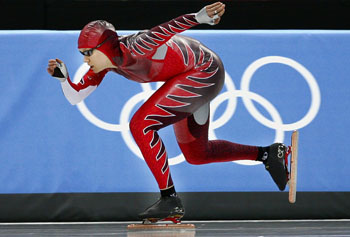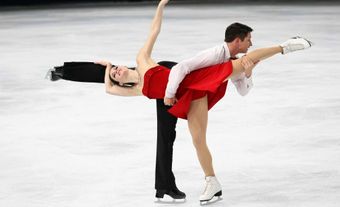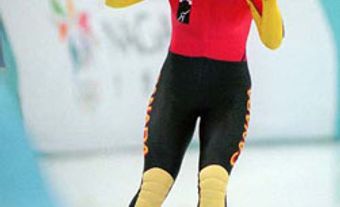
Hockey
Klassen began to take an interest in skating when, at age two, her father gave her a makeshift hockey stick and a pair of skates. She tried a number of sports while growing up, including volleyball, basketball, rugby, badminton, and lacrosse, but she soon gravitated exclusively toward hockey.
In the late 1980s and 1990s, women's hockey was just emerging as an organized sport, and as a result Klassen spent several years playing in AA and AAA boys' leagues. Her opportunity to shine in female competition came in 1995 when Klassen was chosen to play on Team Manitoba at the Canada Winter Games and the Junior National Team at Lake Placid in 1996. When the International Olympic Committee announced that it intended to make women's hockey an official Olympic sport, Klassen hoped to win a spot on the new team but was overlooked. Devastated, she continued to work on her hockey skills, but began speed skating to supplement her hockey training.
Speed Skating
Within a year, she qualified to speed skate at the Canada Winter Games in 1999. Later that year, she earned a spot on the Junior National Team and began winning international competitions in long-track speed skating, particularly the 1000 m. Klassen was chosen to represent Canada at Salt Lake City in 2002, an opportunity that had eluded her as a hockey player in 1998. At her Olympic debut, Klassen collected a bronze medal in the 3000 m and finished fourth place in the 1500 m and the 5000 m.
In 2003, she became the first Canadian woman in 27 years to win the World Championship. Although sustaining a severe injury to her arm when she collided with another skater, she returned to competition and won the World Single Distance Championship in 2004. She achieved several more victories in 2005, winning the World Cup title in the 1500 m and the World Single Distance Championships. As Torino 2006 approached, Klassen continued to hold the world record in both the 1500 m and 3000 m distances.
Torino 2006
At Torino, Klassen was a favourite to win at least three Olympic medals for Canada. Her bronze medal win in the 3000 m was her first during the Games. It was followed by a silver in the 1000 m and a silver in the Team Pursuit. She won gold in her signature race, the 1500 m, and finished her competitions with a bronze medal in the 5000 m.
In addition to winning the most medals at an Olympic competition (five), Klassen’s total of six career Olympic medals meant that she replaced speed skater Marc Gagnon as the most decorated Winter Olympian in Canadian history. (In 2010, fellow speed skater and cyclist Clara Hughes won her sixth Olympic medal to tie Klassen’s record.) To celebrate Klassen’s accomplishments, Canadian officials chose her to carry the flag at the closing ceremonies.
Career Since 2006
In March 2006, Klassen set another world record for the 1000 m, securing another world championship. In 2007 she reached the podium again, winning one silver and two bronze world championship medals, but she was plagued by ongoing knee injuries shortly after which nearly ended her career. Klassen competed at the 2010 Olympic Winter Games in Vancouver, where she placed in the top 20. In 2011, she won a gold world championship medal as a member of the team pursuit, followed in 2012 by a silver in the same event. She did not compete at the 2014 Winter Olympic Games in Sochi.
Honours
In recognition of her achievements, Klassen was awarded the Lou Marsh Trophy as Canada’s athlete of the year in 2006. She also received the Bobbie Rosenfeld Award as Canada's female athlete of the year in 2005 and 2006. In 2010, the Canadian Mint released a 25-cent coin depicting Klassen, to both honour her achievements at Turin and to promote the Vancouver Games.
Awards
- Bobbie Rosenfeld Award (2005, 2006)
- Order of Manitoba (2006)
- Lou Marsh Trophy (2006)
- Inductee, Canadian Olympic Hall of Fame (2014)
- Inductee, Canada's Sports Hall of Fame (2017)
- Inductee, Manitoba Sports Hall of Fame (2017)
- Inductee, Alberta Sports Hall of Fame in (2018)
- Inductee, Canada’s Walk of Fame (2019)

 Share on Facebook
Share on Facebook Share on X
Share on X Share by Email
Share by Email Share on Google Classroom
Share on Google Classroom


